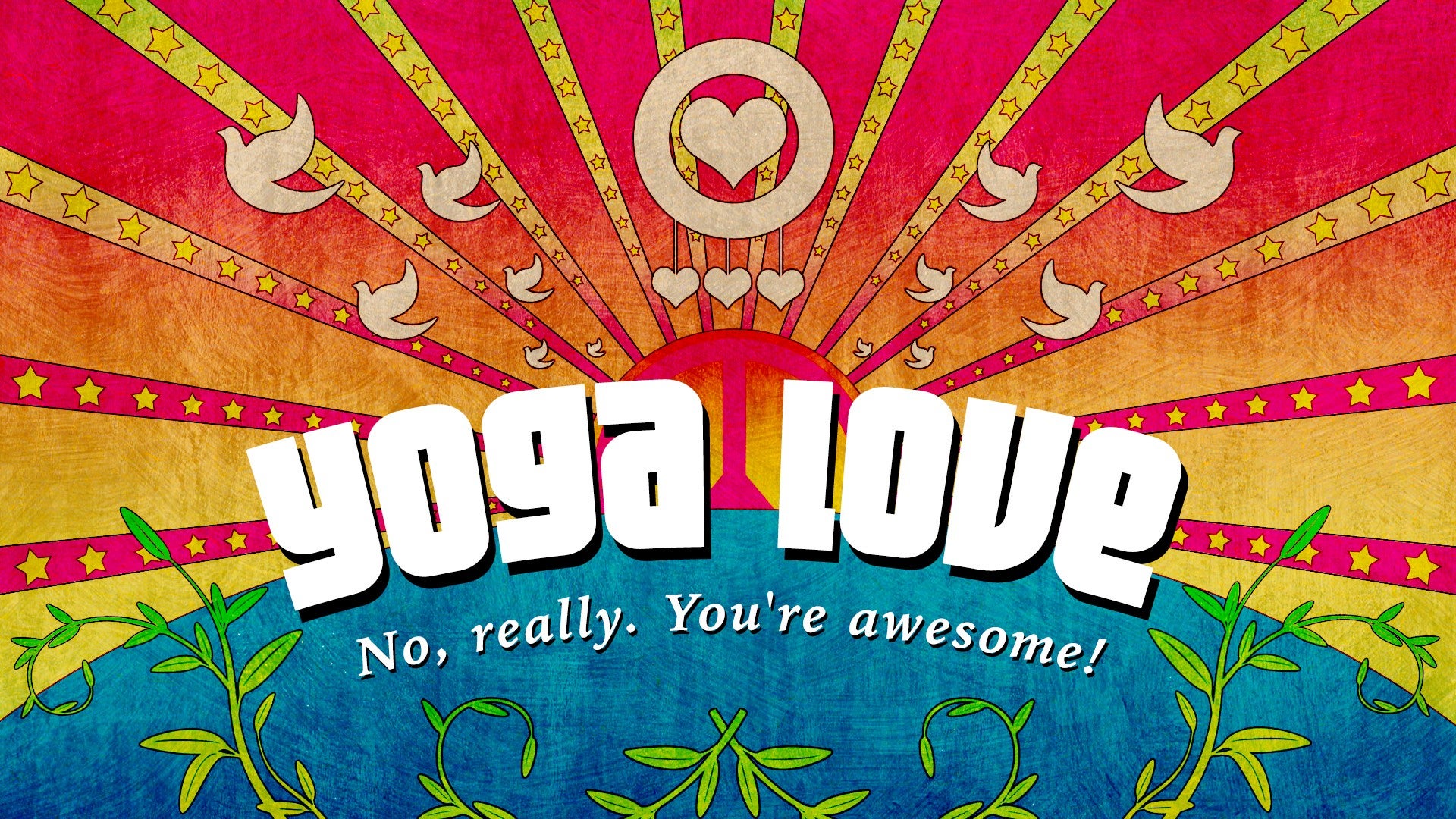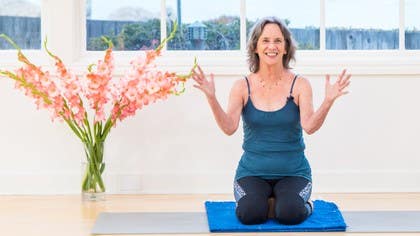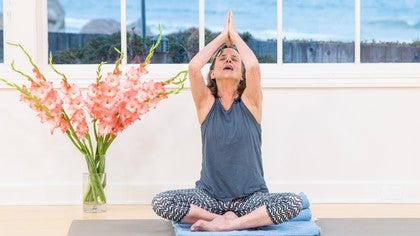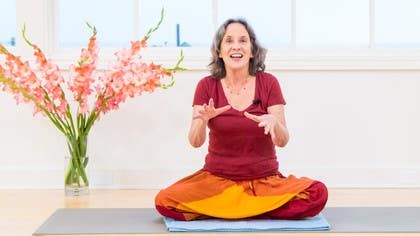Description
About This Video
Transcript
Read Full Transcript
(water rushing) Namaste, and hello again. We've been discussing a lot about body image, what we like, what we don't like about our bodies. I think I just wanna talk, go a little bit deeper, maybe in a slightly different direction. I wanna talk about what happens when our bodies seem to betray us, and I know that sounds a little bit weird, but I think that the best way to describe it, is to think about, the stages of a woman's life. And I'd love to talk about the stages of people's lives, men and women, but true confession says I really work mostly with women and I don't know how, if men have the same experience.
So, I'm gonna really focus on what I know, which is my own experience and other women's experiences. When I think about the different times of my life where my body has sort of gone off the rails, in a way. There are three times, and all three of those times, seemed to... They're when our hormones change, really and truly. It's the fluctuation of the hormones inside the body.
So three times, during puberty, if you get pregnant and have a child, it's during pregnancy, and it's during perimenopause as you move into your menopausal years. And what happens during those times, it's like, I think about it as like a chemistry experiment. So, I have this glass of water, and this glass of water is just a glass of water. And if it sits on my counter for a really long time, it will slowly, slowly, begin to evaporate. If I add heat to it, you know, like those old bunsen burners, or whatever they call them, I'm not a chemistry major, you add heat to the water, it starts to boil really rapidly, and it becomes something else.
It boils away, it becomes steam, and it happens rapidly. So I think about the same sort of thing in the body. I think that when this hormonal stew, this hormonal mix, starts to happen when we change from being a child to an adolescent, a lot of stuff has to happen in the body, to catapult us into that next phase of our lives, so that happens in puberty, and then when you are pregnant, so much has to happen, in tandem, to to form a container, and to form a home for this child that you're carrying. And so once again, it's this big mix, of rapid fluctuations of hormones, so it's not even that the hormones increase, which they do. But it's the fluctuation, that makes the body a little bit un-moored.
And then the last time that women go through this is during perimenopause, when they actually stop their menstrual cycle and move into the menopausal years. And again, lots can happen where all of a sudden you think, "I thought I really knew my body. "I thought we were friends. "And suddenly, I have this round stuff around my middle. "I have splotchy skin, I have, "I mean, what has happened to me?" And it feels a little bit like a betrayal.
So, I think the question that a lot of us have as women, is, first of all, "What the hell, just happened to me?" And second of all, "Does that mean that, "I mean, how does yoga fit into that? "Can yoga help me? "Or does that mean that I can no longer do yoga, "when I can no longer seem to find my ground?" And I think those are really important questions for us. Now, Geeta Iyengar says something that I find fascinating, and she says that young kids, before puberty, can pretty much do anything. They're in their bodies for the most part.
They can do handstands, backflips, they just feel like they got it. Almost the minute they go into puberty, and those hormones start to happen, everything starts to get confusing, and a lot of young girls get very confused, very self-conscious, and suddenly the very things that they thought they could do they don't wanna do. So Geeta says you've got this pre-pubescent thing happening, you also have this post-menopausal woman, who just like the pre-pubescent, her hormones are done, she's like, "Okay, I'm done." This young girl hasn't started yet, this older woman goes, "Okay, I'm done with the hormonal soup." Both of them, if they're healthy, can return to their yoga practice, full on. And pretty much, if they're healthy, can do anything. "The difference," she says, "is that those of us "in post-menopause will approach our practice "with more wisdom." So I find that really kind of an interesting thing, and I'm not quite sure it's true for all of us who have gone into post-menopausal years.
So this is what I think, is the question. Well, I think the concern is, how do I bring yoga into my life, to help mend this rift in my relationship with my body? Is that possible? And if I can no longer do the yoga that I'm used to doing, does that mean that I can't do yoga anymore? Does it mean I'm a loser?
Does it mean I have to get the eye-bags, bolsters and blankets out and relegate myself to a life of restorative poses? So what does that actually mean? I think the real question is, what do we want from our yoga practice? Why, why yoga, for me? Why now, and what do I expect my yoga practice to be and to do for me?
And this is what I think. I think that, I think the practice does change. The practice becomes much more of a listening practice, and less of an automatic, I hit my mat, I begin to move. So, some days, the body might be ready to do a nice, steady fast, energetic, muscular practice. Other days, not so much.
Or it might need me to open my hips a little bit, first, organize my shoulders, kind of find my way, and then move into a little bit stronger practice. There are other days, when that just isn't an option. All I really want to do, actually, is lie down on my back and explore my hips, move maybe into a bridge and hang out there, just to see what's happening, and so what the relationship becomes, is, like I've said earlier on, how am I doin', and what do I need? And the more that my mind can listen to the dictates of my body, the less trouble I get in. If I start to get into this thing, where my mind says, "No, no, no, no, I want you to do this, "no, no, no, more, stronger, "you always have been able to do it, do more." That's when I get into trouble.
Now, sometimes my body will say, "No, no, no," and my mind might say, "Let me make a deal with you. "Why don't you try, why don't you explore your id, "and just see how you are today. "If it doesn't work, I get it, "but that might work, you might try "and see where you land." And that's again, that's part of the relationship. So... during puberty, I think the biggest challenge for young girls is all of the physical changes that's happening to them.
I mean, they have breasts, or they don't and their friends do. They are menstruating, or they don't and their friends are, and, and they feel left out. They suddenly have curves where they were straight up and down. They suddenly can no longer run like the wind, and play sports like they used to. And they're confused.
And they don't want any part of it. I remember one of my kids saying to the Doctor, "I'm sorry, but I'm not going to get my period. "I've decided that I don't wanna do that." And she was very gentle saying, "Well, you might not have a choice, "but you might wanna kind of think about "what that might mean for you." But my daughter was convinced that she had made the right decision, and she was gonna continue to be 11 years old (chuckles) for the rest of her life, right? So I think yoga for young girls, at that adolescent stage, is to move them back into the body. To discover what's actually possible.
It's hard sometimes, to get young girls to do yoga, for sure. And yet, it's sometimes the only time that they have, that's private, that's on their mat, where they don't have to answer to anyone, and there's no mirror, they don't have to compete with that girl over there, or that person over here. She can just be on her mat, and do what she can do, and be okay. So, I think that that's what yoga can do for us, when we're in that sort of confused adolescent state, for sure. And also, yoga, by definition, brings us into community.
And I think that's huge for no matter what transition we're in. We can come into community of like-minded women. That's why we have pre-natal yoga. We don't have pre-natal yoga so you can only do restorative poses. We do pre-natal yoga so that we can explore the body, explore what's possible and talk.
"Oh wow, I feel this, how do you feel?" "Huh, what's your experience?" "Please share with me, please help me to understand." So I think those are two really important times for us. Same in perimenopause, "Wow, am I the only one "that's ever gone through this? "Am I always gonna be this way? "Am I always gonna be having hot flashes, or "going to bed as 7 o'clock in the evening "because I can't stay up?" So I think those are really important issues. And there's also a really interesting concept that I wanna share with you.
When I was doing a pre-natal book, not too long ago, I read this article about the transition that women go through, Momma's go through when they're about to give birth. And it's a transition from being pregnant to giving birth, so it's just as the body starts to go into the beginning stages of labor, but it really hasn't been active yet. So you're really kind of at sixes and sevens. And some women will start to organize, or paint their house, or do stuff, because they're in that in-between time. This woman called this in-between time, Zwischen, which is a German word, for in-between.
And she says, that Zwischen is the time where we're waiting to be called. And for women who are about to give birth, they're moving into this, into really embodying, motherhood, and they're moving into, very very deep into the body, into the mammalian brain, so that they can give birth the way that the body knows how to give birth. And so this in-between time, I really find, is a really important time for any transition that we make. It calls us into silence. It calls us, to move from the external, to the internal.
From the physical minutiae, to a place where we can both surrender and embrace. And for those of us who have gone through, or are going through, these different changes in our bodies, it's like this pause that we need, to say goodbye to the old and embrace what's possible with the new. So this Zwischen, this surrendering the old ways, and embracing our new power, our new, our new being, and it's not as though we completely push away what we had. It's like, "Pfff, not doing that, I'm gonna do that." It's that we unpack, we say, "Oh, okay, "so, what do I need?" It's again, how am I doin' and what do I need? "What do I need, to be grounded in this experience?
What do I need to face this experience? With tenderness and sort of, um, loving curiosity, maybe, I think that's really what we do. And it's not that, I'm gonna move into my menopausal years and suddenly embrace the fact that I have hot flashes and fatigue and, you know, all that different stuff. But I'm going to meet them in a way that, hopefully is gonna soften and mitigate some of the, some of the effects, some of what I'm experiencing. So I think that, I think it's easy enough for me to sit here and say, "Yoga works.
Yoga's gonna like, take all these rifts, all this transition, and (claps) put us all back together again. And that sounds very tidy, and very, um, very nice, but I think it's really hard to do. I think what happens to us, is that, these times of change are very, very confusing and it gets that obsessive, self-centric thinking, back into play, and we've talked about that before where it's not so much, that I'm constantly thinking about myself, that causes me to suffer. But it's when I get into the negative emotions that I'm pushing away and I'm, it's this comparison, that, and "Poor me, "and why isn't it that I can't do this, "what happened to me? "I'm angry, I feel separate, I feel betrayed." And all of this chatter in the mind is playing out and "I don't know what to do.
"And it keeps me not just "separate from myself, "because suddenly this body, "I wanna come back, I wanna control it, "I wanna bring it back to where it was, "and I can't do that." So, I push it away, I don't wanna think about it, I'm embarrassed, I'm ashamed, I'm all these things. And all that is moving through this chattering mind of mine. And I can't seem to let it go. So... "So, how do I move?" and then not only do I feel that I wanna push myself away, my body away, but then I get to where it's really hard for me to connect to others, because I don't really want them to see me as different than I was before.
I don't want them to label me this sort of post-menopausal, what do they... Somebody once said, that post-menopausal women were wise women or crones, and a friend of mine, who's like about 20 years older than I was, when I was writing about that, she said, "Don't you ever... "Call me a crone!" (laughs gleefully) So, it's (chuckling) this sense of sort of redefining, and you know what, at 40 it's hard to really think about myself as a crone, but that's not happening. So how do I move from pushing you away, pushing me away, how do I do that? And that's where I think the beauty of yoga lies.
The beauty of yoga and, in yoga, I'm including meditation, because it's impossible for me to talk about yoga as separate from meditation. Whether I'm doing yoga as a body-based moving meditation, or whether I'm doing a sitting practice, that's my yoga. And what I think works, is to bring the practices in, really coming back to what I just said about listening. If I take, just 10 to 15 minutes a day, I mean, nothing, like monumental, and sit with what is, and just gently, like we've been doing throughout this whole show, gently touch my exhale, gently touch that gap between when the exhale ends and the inhale begins, what I'm also touching, what I'm also allowing myself is to just stop. Stop the effort, stop the chatter, stop...
Stop the comparison and the, um, the hurt, and simply just be. And when we talk about surrender, when we talk about letting go, I'm not talking about letting go of the parts of my body I don't like. I'm not talking about letting go of anything except the judgement. Just allowing myself to feel what my body feels inside. Five or 10 minutes a day.
And I also like, when I really get crazy, and really can't get out, of this, of this self-obsessive thinking, I will actually instead of what potentially says is cultivate the opposite, sometimes I just move right into it. And that becomes that chatty practice that we did earlier, where we just allow those thoughts to happen. And what is so amazing to me, is that those, for me, often that monologue, and sometimes it's even a dialogue, or you know, all kinds of parts of me are speaking. It might start to be very hurtful, shameful, angry, blaming, and if I just allow it to play out, often it will morph, soften, quiet down, and move gently to a place of acceptance. It might only touch there, bounce back, touch there, bounce back, but what it says to me is, under all of this confusion, all this fog, all this doubt, all this stuff, is this place, I call home, and it's still there.
So for me, my practice has become, whether it's soft, whether it's energetic, whether it's quiet, my practice has become a safe haven for me, to reconnect with my body, without having to move through the world without having look in a mirror, without having to wonder I can be in that place of in-between, where where I moved from the external to the internal and I've moved from the chattering minutiae to surrender and embrace. And so as you move into your practice and as you as you notice what's happening to you, whether, you know, whatever stage of life that you're in. I mean, some of us may not even remember going through puberty. I mean, it's not as though I woke up one morning and go, "Damn, I'm... "Is this puberty?" You know, we don't know that, a lot of women don't know that they're moving into the perimenopausal years until we finally figure out that all this stuff that's happening to my body, might be happening for a reason.
So even if we don't know, what these transitions mean, what they're called, as we start to, as our bodies start to change as we start to feel a little bit disconnected a little bit foreign, a little confused, come back to that place of unknowing and rest, in the waiting, rest, in this place, as you're waiting to be called to your next iteration, in a way. So, the invitation, I think, for all of us, even throughout our day, even these little bitty, um, what do you call them? Like little... Stops. Throughout our day, if I feel like I'm getting into this blame, getting into this judgement, my solution for that is, "Where are my feet?
"Where's my ground? "Let me pause. "Let me come back, to center, and begin again. And some days, I'll do that a lot, and some days, not so much. So that's my invitation, is sit as often as you can, explore and listen, as much as as you're able, and check in with yourself, with just as though you were checking in with your best friend.
Check in, notice what's happening, "Ah, here we are again, this is interesting." And that by the way is one of my favorite mantras. Isn't that interesting? Here I go again. So can I come back, hah! Isn't that interesting that you're back again? So becomes a sense of friendly and loving curiosity.
So I invite you to explore that, and I always, always wanna know, how it goes, so check in with me, and enjoy, Namaste.
Yoga Love: Love Your Age
Comments

You need to be a subscriber to post a comment.
Please Log In or Create an Account to start your free trial.












